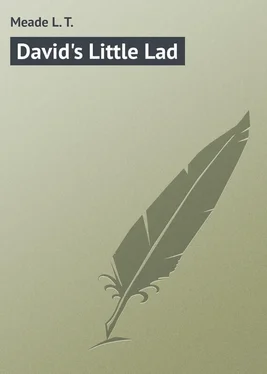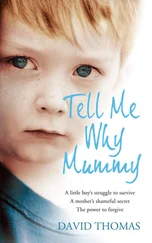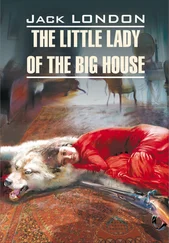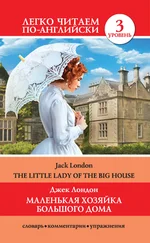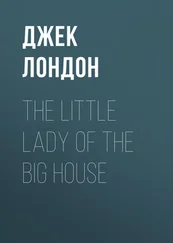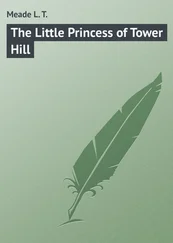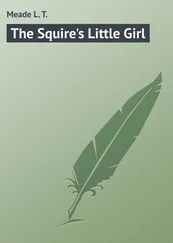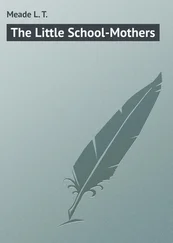L. Meade - David's Little Lad
Здесь есть возможность читать онлайн «L. Meade - David's Little Lad» — ознакомительный отрывок электронной книги совершенно бесплатно, а после прочтения отрывка купить полную версию. В некоторых случаях можно слушать аудио, скачать через торрент в формате fb2 и присутствует краткое содержание. Издательство: Иностранный паблик, Жанр: foreign_prose, на английском языке. Описание произведения, (предисловие) а так же отзывы посетителей доступны на портале библиотеки ЛибКат.
- Название:David's Little Lad
- Автор:
- Издательство:Иностранный паблик
- Жанр:
- Год:неизвестен
- ISBN:нет данных
- Рейтинг книги:3 / 5. Голосов: 1
-
Избранное:Добавить в избранное
- Отзывы:
-
Ваша оценка:
- 60
- 1
- 2
- 3
- 4
- 5
David's Little Lad: краткое содержание, описание и аннотация
Предлагаем к чтению аннотацию, описание, краткое содержание или предисловие (зависит от того, что написал сам автор книги «David's Little Lad»). Если вы не нашли необходимую информацию о книге — напишите в комментариях, мы постараемся отыскать её.
David's Little Lad — читать онлайн ознакомительный отрывок
Ниже представлен текст книги, разбитый по страницам. Система сохранения места последней прочитанной страницы, позволяет с удобством читать онлайн бесплатно книгу «David's Little Lad», без необходимости каждый раз заново искать на чём Вы остановились. Поставьте закладку, и сможете в любой момент перейти на страницу, на которой закончили чтение.
Интервал:
Закладка:
Esther Williams was the daughter of a Glamorganshire man. Her father possessed, at the other side of the county, a fine extent of coal country, and a very large fortune was he able to bestow upon his only child. The fortune consisted of some coalfields, and with the rental from these my father was able to restore Tynycymmer to much of its ancient splendour. My mother’s family was not so old as ours, but being true Welsh, and having beauty and a fortune, this fact was graciously overlooked by us, and we condescended to use her money to our own aggrandisement. I have said that we were a proud family – but of us all, there was none who so upheld the family traditions, and who so rejoiced in the family honour, as the one who was herself only a Morgan by marriage, my mother.
Of the days when she was only Esther Williams, she never cared to speak; her money was never “her money,” but the “Morgans’ money.” Money that brought fresh glory to the old house, was honoured indeed – she regarded herself individually, as a humble instrument destined to do much good – for herself, her appearance, her character, she felt little pride or satisfaction; but for the sake of the name given to her by her husband, she would indeed walk with stately mien, and uphold her dignity to the last; and well she could do it, for though a little woman, she was singularly dignified and graceful-looking, and was, in short, every inch worthy of the high position she believed herself to have attained. She possessed the dark eyes and raven locks of the true Welsh woman. How I came to be fair-haired and blue-eyed remained a mystery, and was reckoned rather a disgrace. When a tiny child, Gwen had impressed this fact upon me, and I remember blushing and looking distressed, when fair people were mentioned. Yes, my mother was a beautiful woman; I have a vivid memory of her, as she looked in my father’s lifetime, dressed in the time-honoured black velvet, the old jewels flashing in her hair, as bending down her haughty dark face, until it touched my fair one, she filled my greedy and receptive little brain with the ancient stories of our house.
I heard of the ghosts and the deeds of vengeance from Gwen, of the fairies and deeds of glory from mother.
Yes, my mother was very beautiful, and with the exception of two specks in the fair fruit of her heart, the best woman I know. How loving she was, how tender, how strong, how brave! But the specks marred the full perfection: one speck was her pride, the other her unjust preference for Owen. At the time of which I write, I did not consider this preference unjust, for I too loved Owen best, but even then I had felt the full power of her pride. I mention it here in order to make David’s sorrow and David’s joy more fully understood.
Those retrenchments which took place when David came of age, were no small sorrow to mother. When the housekeeper went away, and many of the servants were dismissed, when the old coach was not sold, but put out of sight in some unused coach-house, when the horses were parted with to the highest bidder; – mother felt pain, though of her feelings she never spoke, and to their expression she gave no vent; her pride was hurt by this lowering of the Morgans’ importance, but her very pride was its own shield in preventing its betrayal, and she knew then, though I did not, why these things were done. But a year later, that pride received another blow. I remember the beginning of it. The postman brought to us a letter. I say to us , for all our letters, with the exception of those few received when David returned so suddenly from Oxford, were public property. This letter contained news. A distant cousin of mother’s had died in London; had died and left one orphan daughter quite unprovided for. This cousin was a Williams, but though calling himself by the well-known Welsh name, was no true Welshman: his family had long ago settled in England, had married English wives, and had become, in mother’s opinion, nobodies. The unprovided daughter had not written herself, knew nothing indeed about the letter, but a friend of hers in despair how best to help her, had ventured to inform Mrs Morgan of Tynycymmer, that her cousin’s child was a pauper.
“Have her here on a visit,” said David, promptly.
Mother, her heart full of sorrow and pity for the lonely girl, assented at once. Amy Williams was invited and came.
And now came mother’s trouble and the shock to her pride, for David fell in love with the penniless English girl.
I am not surprised at it, and looking back on it now, I am glad. Amy was the only person I ever met who understood David, and who appreciated him. I am glad for his sake, and hers, that they had one short happy year together. For however tender and considerate David was with mother, on this point he was firm; he thought more of Amy’s happiness than mother’s pride, and he married Amy though mother opposed it bitterly. Of course I did not hear a great deal about it. I was very young, only fourteen, at the time, and mother ever kept her feelings well under control, and not one of the servants even guessed how much she disapproved of this marriage; but I remember on David’s and Amy’s wedding-day, running in to mother to show her my white muslin bride’s-maid’s dress, and mother kissing me, and then saying, with concentrated bitterness, “Had Owen been the eldest son, whatever his faults, he would never have given me the pain David has done to-day.”
Fond and proud as I was of Owen, I did not quite like mother to say that of David on his wedding-day. Well, he and Amy were married; they spent a week in North Wales, another week in London, and then came home. Mother wanted to transfer the reins of authority into Amy’s hands, but Amy would not take them; she was the meekest little thing I ever knew, she was quite too meek to please me. I never got to know her, I never really cared for her; but she suited our David, and he suited her. His presence was to her as the sun to the flower, and truly he was a great sun for the little fragile thing to bask in. I am sure she had a great deal in her which David alone could draw out, for after talking to her he always looked happy, his whole face in a glow. Looking back on it now, I can recall nothing brighter than David’s face during that year. I have said that Amy was meek, I never remember her showing any spirit but once, but that occasion I shall not quickly forget. She and I were sitting together in the arbour overhanging the sea. She was not very well, and was lying back in a little wicker chair, and I was seated at her feet, arranging different coloured sea weeds. As I worked, I talked of Owen. I did not mean it in the least, but as I spoke of my favourite brother, of his beauty and talent, I unconsciously used David as a foil to show him off by. I was speaking more to myself than to Amy. I was not thinking of her at all.
Suddenly she started to her feet, her pale face grew crimson, her soft brown eyes flashed angrily.
“Gwladys,” she said, “little as you think of David now, some day you will see that he is a nobler man than a thousand of your Owens.”
“How can you speak so, when you don’t know Owen,” I retorted, the hot blood of the Morgans flying into my cheeks at this unexpected show of spirit.
“I know David,” she replied, and she burst into tears.
Poor little Amy! that night a son was born to her and David, and that night she died.
Perhaps had mother and I understood Amy, and cared for her more, David might have told us something of the sorrow which followed quickly on his joy. Most of the time between Amy’s death and her funeral, he spent in her room. After the funeral he went away for a week; he told neither mother nor me where he was going! we never heard how or in what part of the world he spent that week; on his return he never mentioned the subject. But his face, which on the day of Amy’s funeral was convulsed with agony, was after that short absence peaceful, and, I say it without expecting to be misunderstood, even happy.
Читать дальшеИнтервал:
Закладка:
Похожие книги на «David's Little Lad»
Представляем Вашему вниманию похожие книги на «David's Little Lad» списком для выбора. Мы отобрали схожую по названию и смыслу литературу в надежде предоставить читателям больше вариантов отыскать новые, интересные, ещё непрочитанные произведения.
Обсуждение, отзывы о книге «David's Little Lad» и просто собственные мнения читателей. Оставьте ваши комментарии, напишите, что Вы думаете о произведении, его смысле или главных героях. Укажите что конкретно понравилось, а что нет, и почему Вы так считаете.
